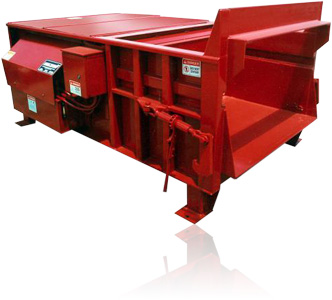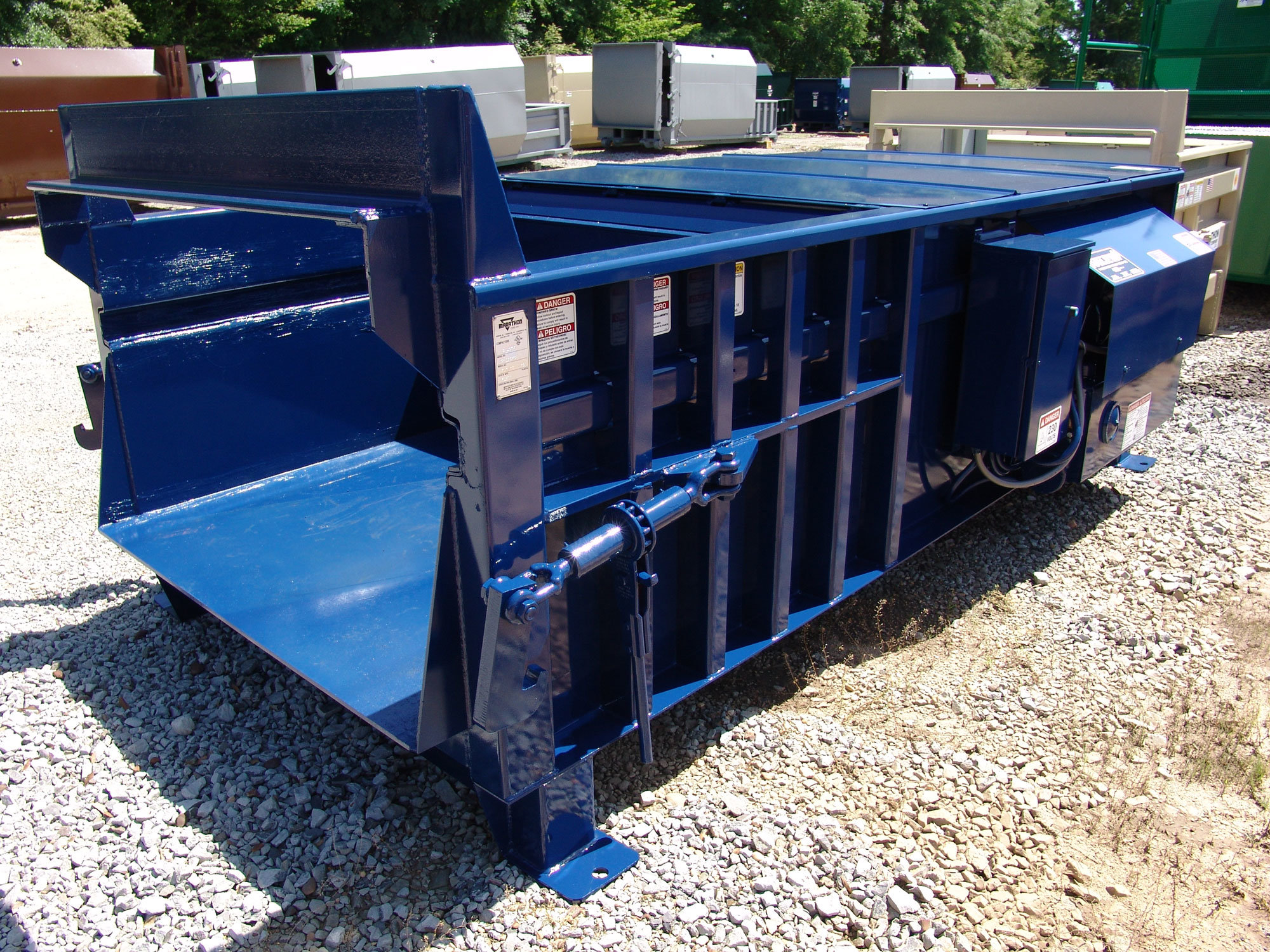Just How Waste Equipment Boosts Efficiency in Trash Compactor Procedures
Waste Equipment plays an essential function in improving the performance of garbage compactor operations. By utilizing advanced sensing units and automation, these systems boost compaction cycles and keep an eye on tons abilities successfully. This integration not just preserves energy yet also minimizes pick-up frequency and associated expenses. As companies increasingly take on these technologies, the ramifications for functional sustainability and administration techniques come to be more clear. What various other advantages might arise from these innovations in waste Equipment?
The Function of Advanced Sensors in Compaction Effectiveness
Advanced sensors play a necessary duty in boosting the performance of trash compactors. These sophisticated tools keep an eye on numerous parameters, including tons ability, wetness levels, and compaction cycles, allowing for real-time modifications. By precisely determining the amount of waste, sensing units make it possible for compactors to enhance their procedure, guaranteeing that energy consumption is decreased while taking full advantage of the volume of waste processed.
Progressed sensors contribute to anticipating upkeep by identifying possible problems before they lead to Equipment failing. This proactive approach not only decreases downtime however also prolongs the lifespan of the compactor. In enhancement, information collected from these sensing units can be analyzed to enhance functional techniques, causing improved waste monitoring techniques. Overall, the combination of advanced sensing units in garbage disposal considerably enhances their performance and operational performance, converting into expense savings and a more sustainable technique to garbage disposal.
Longevity and Layout: Products That Matter
The durability and layout of garbage compactor hinge significantly on the products used in their construction. Top notch steel is usually the main option, giving toughness and resistance to tear and put on. This robust product holds up against the enormous stress put in throughout compaction, guaranteeing long life and reliability. In addition, components such as hydraulic systems are generally crafted from corrosion-resistant alloys to stop destruction over time, improving functional efficiency.
Style likewise plays an essential function in functionality; tactical reinforcements and ergonomic shapes can significantly affect efficiency. Suppliers commonly focus on modular layouts, enabling less complicated upkeep and repair work. In addition, advancements in coating innovations, such as powder layer, improve resistance to environmental variables, including wetness and chemicals. Ultimately, the mindful choice of products not only boosts the structural honesty of trash compactors but additionally adds to their overall efficiency and efficiency in waste management procedures.
Automation and Smart Technology in Waste Equipment

Automated compactors can maximize compaction cycles based on the quantity of waste, making best use of area and improving functional effectiveness. Integration with mobile applications allows customers to keep an eye on and control compactors from remote locations, enhancing ease and responsiveness. By embracing these modern technologies, waste administration firms can not only improve their functional process but additionally contribute to even more sustainable methods by reducing waste and maximizing resource usage. Overall, automation and clever modern technology stand for a significant jump forward in the effectiveness of garbage disposal procedures.
Information Analytics for Enhancing Waste Management
Using data analytics supplies waste management business an effective device for enhancing procedures and boosting performance. By collecting and assessing data from numerous resources, such as compactor performance metrics and waste generation patterns, business can obtain valuable insights. These insights enable them to make enlightened decisions concerning collection routines, compactor use, and upkeep demands.
Predictive analytics can forecast waste generation trends, enabling business to designate sources extra effectively and avoid potential overflows or underutilizations of Equipment. Real-time monitoring with information analytics likewise boosts the capacity to react promptly to operational challenges, reducing downtime and improving solution integrity.
In addition, incorporating data analytics with existing waste administration systems fosters a culture of continual improvement. By tracking and recognizing inadequacies performance in time, companies can refine their processes and take on ideal methods, inevitably leading to a more sustainable and reliable waste administration technique.
Expense Cost Savings With Improved Functional Efficiency
By enhancing procedures and minimizing waste, firms can attain considerable expense savings in their waste administration procedures. Enhanced functional efficiency in garbage disposal decreases the regularity of pick-ups, resulting in reduced transportation prices. Furthermore, advanced waste Equipment permits for maximum compaction, maximizing container capacity and lessening the requirement for additional containers.
This enhanced efficiency not only lowers waste disposal costs yet likewise prolongs the life-span of Equipment, minimizing maintenance expenses. Automated tracking systems provide real-time data, enabling aggressive adjustments in waste handling, which can in addition enhance performance and lessen unplanned expenses.
Additionally, robust training programs for team on Equipment usage can cause boosted functional methods, even more driving down expenses. Inevitably, the combination of efficient waste Equipment cultivates an economical waste management approach that profits firms financially while making sure smoother procedures.
Environmental Effect: A Lasting Strategy to Waste Monitoring

Moreover, carrying out recycling campaigns alongside compaction procedures enables companies to draw away products from garbage dumps, promoting circular economic climate principles. Services that take on eco pleasant practices not just enhance their corporate obligation however also appeal to progressively eco-conscious customers. By focusing on sustainability in waste management, companies can achieve a dual benefit: boosting functional performance while actively adding to environmental conservation. This balanced approach placements businesses as leaders in sustainable methods, promoting a healthier planet for future generations.
Frequently Asked Concerns
Exactly How Often Should Waste Equipment Be Kept for Optimal Performance?
The regularity of upkeep for waste Equipment typically depends on use and producer referrals - Industrial waste compaction equipment. Generally, inspections ought to occur quarterly, with complete maintenance annually to ensure peak performance and avoid potential breakdowns or inadequacies
What Kinds of Waste Can Be Refined in Garbage Compactors?
Garbage compactors can process various kinds of waste, consisting of cardboard, paper, plastics, and non-hazardous food waste. However, individuals must stay clear of condensing Commercial waste compactor equipment hazardous materials, steels, and fluids to ensure efficient and safe operation.
Are There Safety And Security Functions in Modern Trash Compactors?
Modern garbage compactor commonly consist of safety features such as automated shut-off devices, emergency situation quit switches, and sensing unit systems (Industrial waste compaction equipment). These improvements are made to safeguard users from prospective risks throughout procedure, advertising a safer working setting
How Does Waste Equipment Influence Labor Requirements?
The impact of waste Equipment on labor needs is considerable; it frequently reduces the demand for hands-on labor, streamlining processes and boosting performance. Consequently, fewer workers are needed, permitting companies to allot resources much more successfully.
What Is the Ordinary Lifespan of a Garbage Compactor?
The ordinary life-span of a garbage compactor normally ranges between 10 to 15 years, depending upon usage, maintenance, and environmental aspects. Routine maintenance can prolong this lifespan, making certain ideal performance and reliability throughout its operational years.
By adopting these technologies, waste management companies can not just boost their functional operations yet likewise contribute to more sustainable techniques by minimizing waste and enhancing source use. By simplifying procedures and lessening waste, companies can attain considerable expense savings in their waste management procedures. Sustainable waste management approaches, specifically in garbage compactor operations, contribute significantly to decreasing garbage dump waste and lowering carbon impacts. Modern waste Equipment is created to enhance compaction, thereby lowering the quantity of waste needing disposal. Garbage compactors can refine different types of waste, consisting of cardboard, paper, plastics, and non-hazardous food waste.